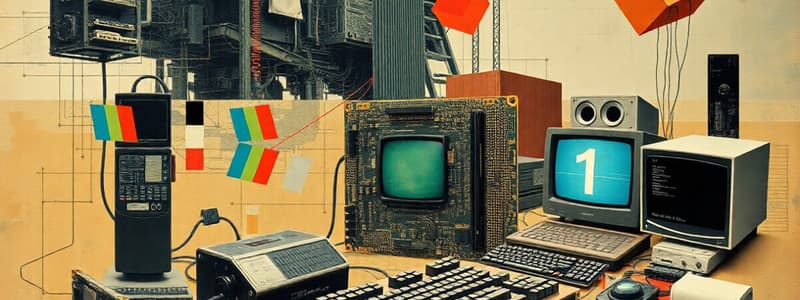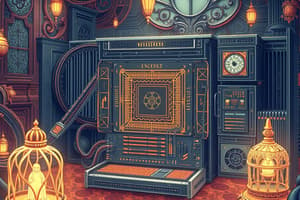Podcast
Questions and Answers
Which programming paradigm is characterized by breaking a problem down into smaller parts or functions?
Which programming paradigm is characterized by breaking a problem down into smaller parts or functions?
- Procedural programming (correct)
- Declarative programming
- Object-oriented programming
- Functional programming
What is the correct order of steps in the software development life cycle (SDLC)?
What is the correct order of steps in the software development life cycle (SDLC)?
- Requirements gathering, Design, Implementation, Testing, Deployment, Maintenance (correct)
- Requirements gathering, Design, Deployment, Maintenance, Implementation, Testing
- Design, Testing, Implementation, Deployment, Maintenance, Requirements gathering
- Implementation, Requirements gathering, Design, Testing, Deployment, Maintenance
Which software development methodology is primarily focused on flexibility and iterative progress?
Which software development methodology is primarily focused on flexibility and iterative progress?
- Waterfall
- Agile (correct)
- V-Model
- Spiral
What role does debugging play in the software development process?
What role does debugging play in the software development process?
Which tool is specifically designed to manage code changes and collaboration among developers?
Which tool is specifically designed to manage code changes and collaboration among developers?
What is the primary function of the Central Processing Unit (CPU) in a computer?
What is the primary function of the Central Processing Unit (CPU) in a computer?
Which of the following statements accurately describes RAM?
Which of the following statements accurately describes RAM?
Which type of storage device is generally faster than Hard Disk Drives (HDDs)?
Which type of storage device is generally faster than Hard Disk Drives (HDDs)?
What role do input devices play in a computer system?
What role do input devices play in a computer system?
Which of the following components is often dedicated to processing graphics?
Which of the following components is often dedicated to processing graphics?
What is the purpose of software development?
What is the purpose of software development?
Which of the following is NOT considered an input device?
Which of the following is NOT considered an input device?
What does the motherboard do in a computer system?
What does the motherboard do in a computer system?
Flashcards
CPU
CPU
The brain of the computer, responsible for performing calculations and executing instructions.
RAM
RAM
Temporary memory holding data and instructions the CPU is currently using.
Storage Devices
Storage Devices
Non-volatile devices that store data permanently, even when the computer is off.
Input Device
Input Device
Signup and view all the flashcards
Output Device
Output Device
Signup and view all the flashcards
Computer Architecture
Computer Architecture
Signup and view all the flashcards
Software Development
Software Development
Signup and view all the flashcards
Programming Languages
Programming Languages
Signup and view all the flashcards
Software Development Life Cycle (SDLC)
Software Development Life Cycle (SDLC)
Signup and view all the flashcards
Software Development Methodologies
Software Development Methodologies
Signup and view all the flashcards
Software Testing
Software Testing
Signup and view all the flashcards
Integrated Development Environments (IDEs)
Integrated Development Environments (IDEs)
Signup and view all the flashcards
Version Control Systems
Version Control Systems
Signup and view all the flashcards
Study Notes
Computer Technology
- Computers are electronic devices that accept data, process it according to instructions, and produce output.
- Central to the computer's operation is the Central Processing Unit (CPU), which interprets and executes instructions.
- Key components like memory (RAM), storage (hard drives), and input/output devices (keyboard, mouse, monitor) are vital for functionality.
- Computer architecture designs the structure and function of the computer. This includes how instructions are executed and data is managed within the system.
- Different types of computers exist, from personal computers to supercomputers, each with varying processing capabilities and sizes.
- Types of computing devices include personal computers like desktops, laptops, and tablets, as well as mobile devices, servers, and embedded systems.
Hardware Components
- Central Processing Unit (CPU): The brain of the computer, performing calculations and executing instructions.
- Different CPU architectures exist, including x86 and ARM, each with varying performance capabilities.
- Random Access Memory (RAM): Temporary memory used to store data and instructions currently being used by the CPU. RAM is volatile, meaning it loses its contents when the power is turned off.
- Storage Devices: Provide non-volatile (permanent) data storage.
- Hard Disk Drives (HDDs) use magnetic storage.
- Solid State Drives (SSDs) use flash memory, generally faster than HDDs.
- Other storage types like optical discs (CDs, DVDs) and cloud storage are also available.
- Input Devices: Allow users to input data into the computer.
- Keyboard, mouse, scanner, microphone, and touch screens are examples.
- Output Devices: Display results from the computer.
- Monitor, printer, and speakers are examples.
- Motherboard: Connects all hardware components together.
- Contains slots for cards like graphics cards and network cards.
- Graphics Processing Unit (GPU): Dedicated to graphical processing, enabling faster and more efficient rendering of images and videos. Often used in video games and image editing software.
- Other hardware: Buses transfer data between components. Network interface cards (NICs) enable network connectivity.
Software Development
- Software development is the process of creating software applications.
- It involves designing, coding, testing, debugging, and deploying software.
- Programming languages provide the means to instruct computers how to perform tasks. Examples of languages include Python, Java, C++, JavaScript, and many others.
- Programming paradigms represent different styles of programming, including procedural, object-oriented, and functional. Each has strengths in different situations.
- Software development life cycles (SDLCs) define structured steps for creating software:
- Requirements gathering & analysis
- Design
- Implementation/coding
- Testing
- Deployment
- Maintenance
- Software development methodologies describe the overall approaches, like Agile, Waterfall, and others. Different methodologies prioritize varying factors, like flexibility, planning vs. iteration, and documentation. Different circumstances call for different methodologies.
- Software testing is critical to ensuring quality. Various testing techniques ensure the software functions as intended and meets user requirements.
- Software design encompasses creating architectural diagrams, user interfaces, and data structures to plan the functionality and structure of the software application.
- Tools and platforms for development:
- Integrated Development Environments (IDEs) like Visual Studio, Eclipse, and NetBeans provide comprehensive tools for code editing, debugging, and testing.
- Version control systems like Git manage code changes and collaboration among developers effectively.
- Debugging is an essential part of software development, identifying and fixing errors in the code to ensure the software functions correctly.
- Software deployment involves releasing the developed software to users, which often includes steps like installation, configuration, and maintenance.
- User experience (UX) design is an important aspect, focusing on creating software that is user-friendly, intuitive, and provides a positive user experience.
Studying That Suits You
Use AI to generate personalized quizzes and flashcards to suit your learning preferences.




